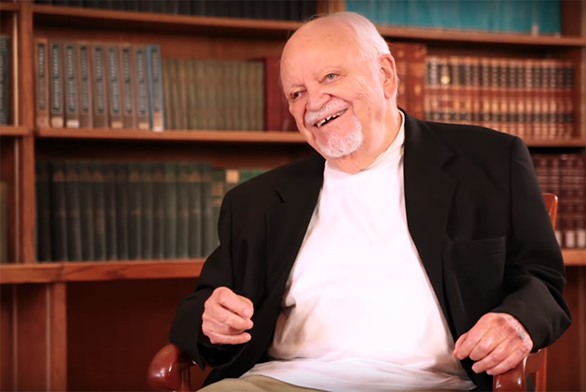Elliott Zuckerman on the Messiness of Learning
February 25, 2019 | By Kimberly Uslin

Retired tutor Elliott Zuckerman recently appeared in an episode of Higher Gossip, a documentary series by two Graduate Institute alumni about St. John’s College’s longest-serving tutors.
“One of the reasons we have talking in seminar is that when you attempt to say something, the most important thing is the attempt to say it, because that leads to something you might not be able to formulate at the time,” he explains in a post-airing interview. “You could have a seminar that’s absolutely perfect as a video—beginning, middle, and end—but it might ultimately be absolutely useless because no one learned anything. The messiest of seminars, which might make for a bad video, can be great if one person sees something he otherwise might not have seen.”
A good seminar, according to Zuckerman, requires “attention and attempt.” Students must remain focused on the text and on the conversations of their peers, and they must try, however imperfectly, to attempt to articulate their thoughts. And while it may have been beneficial to his own academic career to have had more of this chance to reason himself, he says, he makes clear that to be a professor, rather than a tutor, would have been no life for him.
“I would have lectured, let’s say, on Aristotle’s Poetics. I would hate to hear, ‘This is my 35th year of lecturing on the Poetics.’ Can you imagine anything so awful?”
“I stayed at St. John’s in large part because it was honest teaching,” he continues. “In a lab that was new to me, I could say [to students], ‘I had the chance to get this straight last night. Why didn’t you?’”
While he often taught music, having studied music theory extensively, Zuckerman says his favorite classes were further outside his bailiwick, covering such subjects as the long proofs of Appollonius. His favorites tend to be unconventional; of the great works of Western literature, Zuckerman’s picks wouldn’t necessarily be at top of mind for most— Gulliver’s Travels, Shakespeare’s Antony and Cleopatra, the works of William James.
(His least favorite? “When I first did Plotinus, there was no good translation at all, so it all sounded like whipped cream.”)
In the documentary, Zuckerman talks at length about what is often called the “Jacob Klein” era at St. John’s, which took place after the founders left and the first new wave of administrators came to campus. Like Eva Brann in her Higher Gossip episode, Zuckerman speaks fondly of his early years at the college.
“The bromide about the whole thing—and it’s probably true—is that St. John’s could only have been started by Scott Buchanan and could only have been made to last by Jacob Klein,” he says. “I think in a way that’s right, but that may be true of any institution. There’s a time after it’s founded when it takes on its characters.”
While things have in some way changed, he acknowledges, the fundamentals of St. John’s remain the same—namely that “the classes are still good,” as he recently learned from his former student and now current St. John’s tutor Zena Hitz (A95).
Though Zuckerman officially retired in 1995, he still leads the occasional class during the summers or in the Graduate Institute. More than ever, though, he’s focused on the personal philosophical questions that he still longs to answer. As he says in the documentary episode, “life is so short that we’re lucky enough if we see a few questions that are important to us.”
Among them, he says later, is the question of whether art can redeem life, which has been of considerable personal significance to Zuckerman.
“I just finished reading all of Proust—I hasten to add, in English. I had read it before, but this time I wanted to read it with [this] question: Is Proust finally saying that art redeems life? And I’m still not sure.”
“Art has redeemed my life—music and painting and poetry,” Zuckerman explains. “I don’t like to think that’s the case, and yet I don’t know what else to do when I can’t really have any other belief. It remains a question, and it’ll remain a question on my deathbed.”

